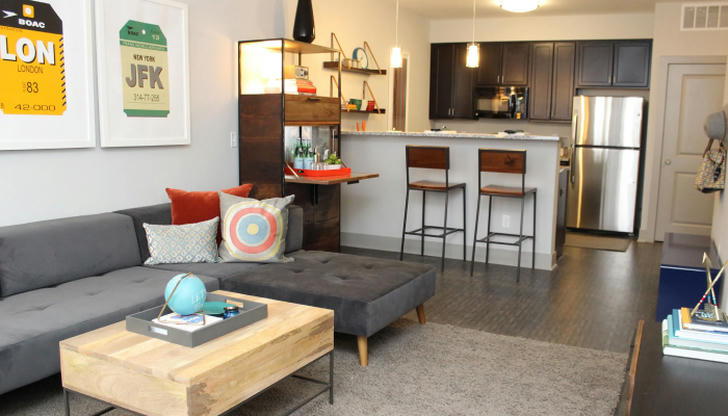Apartment Rental: A Comprehensive Guide
The rental market is a dynamic and essential component of urban living, offering flexible housing solutions for individuals and families not ready to commit to homeownership. Renting an apartment provides a balance between affordability and comfort, allowing tenants to live in desirable locations without the long-term commitment. This article explores various aspects of apartment rentals, from understanding the rental process to navigating legal considerations and practical tips for finding the right home.

Understanding the Rental Process
1. Researching Locations
Choosing the right location is one of the most critical decisions when looking for an apartment. Factors such as proximity to work, schools, public transportation, and amenities like grocery stores and parks play a significant role in determining quality of life. Prospective tenants should consider neighborhoods that align with their lifestyle and budget. For example, young professionals might prioritize areas close to business districts, while families may opt for quieter residential zones with good schools.
Case Study:Li Xiaoli, Wall Street Finance Professional:
Li needed an apartment near his workplace. He found a studio apartment just 10 minutes away from his office in Lower Manhattan. Despite higher rent, this choice saved him time and travel expenses, making it a worthwhile investment.
2. Setting a Budget
Establishing a realistic budget is crucial before beginning the apartment search. Rent typically accounts for the largest portion of monthly expenses, but utilities, internet, groceries, and other costs must also be considered. A common guideline is to allocate no more than 30% of gross income towards rent, though this can vary by city and personal circumstances. Creating a detailed budget plan helps avoid financial strain later on.
Case Study:Zhang Xiao, Silicon Valley Engineer:
Zhang’s high salary allowed him flexibility, but he kept his rent at 25% of his earnings. This strategy ensured he had enough funds for travel, hobbies, and savings, enhancing his overall quality of life.

Legal Considerations
1. Lease Agreements
A lease agreement is a legally binding contract between landlord and tenant, detailing terms like lease duration, monthly rent, payment methods, security deposit requirements, and maintenance responsibilities. Tenants should carefully review these documents before signing to ensure they understand their rights and obligations. Consulting a real estate lawyer can provide valuable guidance for any disputes or questions.
Case Study:Zhou Xiaobin, Los Angeles Photographer:
When her landlord tried to increase rent beyond market rates, Zhou used California tenant protection laws to negotiate a reasonable increase and extended her lease. Her knowledge of local regulations proved invaluable.
2. Tenant Rights
Understanding tenant rights is vital for protecting oneself during the rental period. Laws cover issues such as habitability standards, discrimination protection, eviction procedures, and privacy rights. Landlords must maintain safe living conditions, respond promptly to repair requests, and give adequate notice before entering the unit. Familiarizing oneself with local regulations helps tenants advocate for fair treatment and resolve conflicts effectively.
Case Study:Liu Xiaoming, Chicago Teacher:
Facing noise complaints from neighbors, Liu leveraged Illinois noise ordinances to address the issue with property management, achieving a satisfactory resolution. His proactive approach ensured a peaceful living environment.

Practical Tips for Finding the Right Home
1. Utilizing Online Platforms
The internet has revolutionized apartment hunting, offering numerous online platforms dedicated to connecting renters with available properties. Websites like Zillow, Apartments.com, and Craigslist provide extensive listings with photos, virtual tours, and user reviews. Social media groups and forums offer insider knowledge about specific neighborhoods or buildings.
Case Study:Chen Xiaohua, San Francisco Entrepreneur:
While inspecting an apartment, Chen discovered a nearby startup incubator, which proved beneficial for his career. This unexpected feature led him to sign the lease quickly.
2. Inspecting Potential Units
Once potential apartments are identified, scheduling in-person inspections is essential. During visits, pay attention to the building’s condition, cleanliness of common areas, noise levels, and any visible damage or needed repairs. Asking questions about neighbors, management responsiveness, and community features provides insights into daily life at the complex.
Case Study:Mr. and Mrs. Wu, Retired Couple in Miami:
They focused on safety records and medical facilities when choosing a new home, eventually settling in a secure area near a hospital. Their thorough research ensured a smooth transition into retirement.

Real-Life Case Studies
1. The Urban Professional’s Search
Sarah moved to San Francisco for a new job opportunity and began her apartment hunt online. She used several platforms to filter listings according to her needs—proximity to tech hubs, affordable rent within her salary range, and pet-friendly policies. After touring multiple places, she chose a studio near downtown that offered modern amenities and a vibrant neighborhood atmosphere. Sarah appreciated the convenience of having cafes, gyms, and parks within walking distance, which enhanced her work-life balance.
Enhanced Analysis:
Sarah’s decision was influenced by her need for a short commute and a lively social scene. By prioritizing these factors, she found an apartment that perfectly fit her lifestyle. Her experience underscores the importance of aligning rental choices with personal priorities.
2. Family Finds Ideal Neighborhood
John and Lisa were relocating from Chicago to Austin with two children and wanted to settle in a family-oriented area. They prioritized school ratings, safety statistics, and recreational facilities when researching locations. Through word-of-mouth recommendations and thorough investigation, they discovered a suburban enclave known for its excellent education system and tight-knit community. Their newly rented three-bedroom townhouse provided ample space for the kids and access to nearby playgrounds and sports leagues, ensuring a smooth transition for the entire family.
Enhanced Analysis:
John and Lisa’s relocation required careful consideration of educational opportunities and community support. By focusing on these elements, they found a home that met both their immediate and long-term needs, illustrating the value of comprehensive planning in the rental process.
3. Student Life in College Town
Michael was starting his freshman year at a university in Boston and sought accommodation close to campus. He joined Facebook groups for incoming students and attended off-campus housing fairs to gather information about local residences. Eventually, he found a cozy shared apartment within a short walk from classes, complete with roommates who shared similar interests. Living independently taught Michael valuable life skills while fostering connections with peers and participating in student organizations.
Enhanced Analysis:
Michael’s experience highlights the benefits of engaging with student communities and leveraging peer networks. By actively seeking out information and forming connections, he secured a living situation that supported his academic and social growth.
Conclusion
Renting an apartment is a significant decision that impacts daily routines and overall well-being. By conducting thorough research, setting realistic expectations, understanding legal frameworks, and leveraging available resources, individuals can navigate the rental market successfully. Each person’s journey varies, shaped by unique goals and circumstances. Real-life examples demonstrate how careful planning and thoughtful consideration lead to satisfying outcomes. Whether seeking a temporary residence or establishing roots in a new city, approaching apartment rentals with diligence ensures a positive experience and contributes to personal growth. This expanded guide provides a deeper look into the nuances of apartment renting, enriched with real-world scenarios that highlight the importance of strategic decision-making and thorough preparation.
